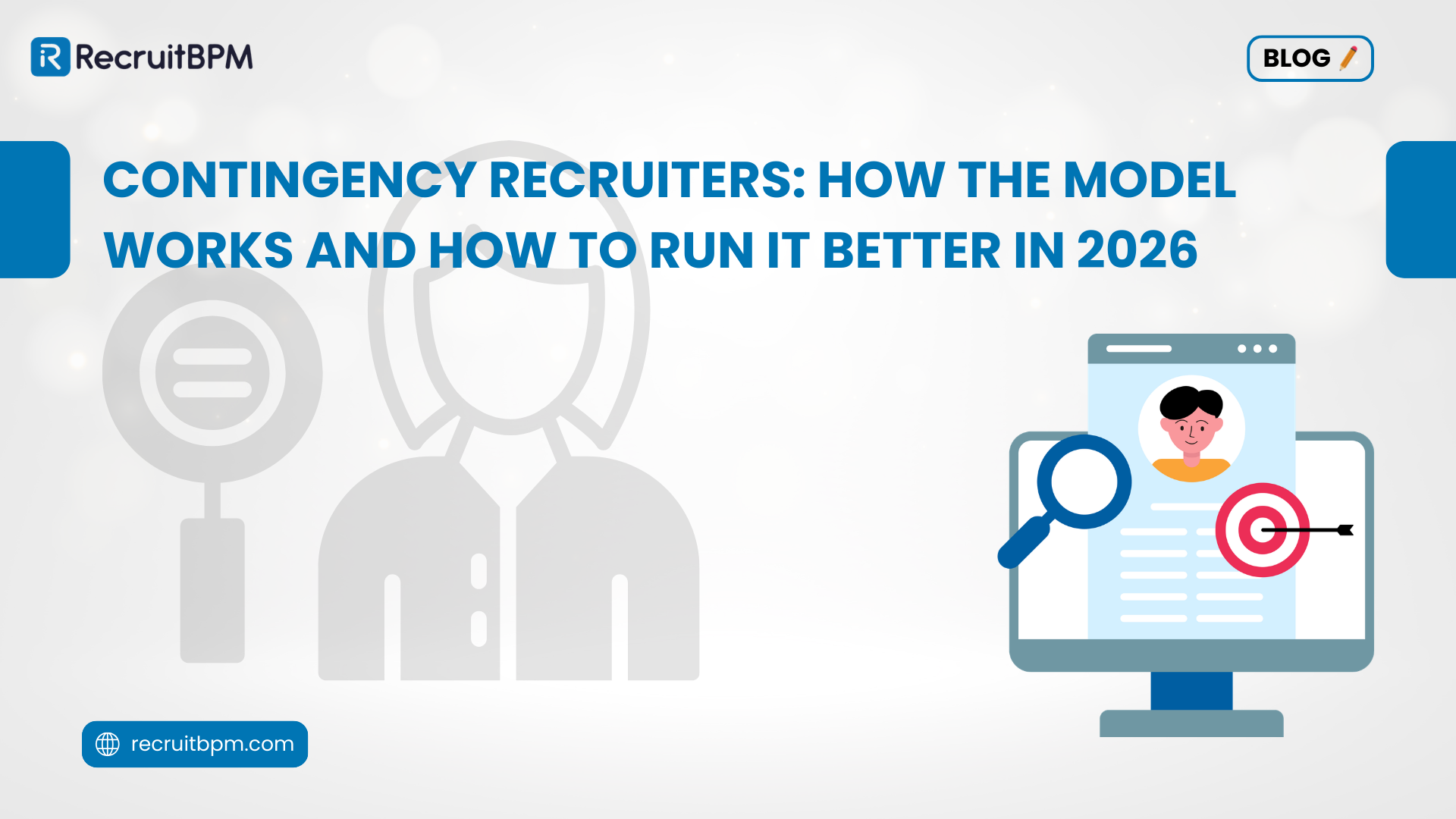Running a contingency desk means you carry all the risk. You source, screen, and submit, and you only get paid if the client hires your candidate. That pressure is real. But it’s also what makes this model so competitive and so rewarding when you execute it correctly.
The contingency recruiting model isn’t fading. According to workforce trend research, the contingent workforce is projected to make up over 40% of the global workforce by 2025. Companies are leaning into flexible, results-driven talent acquisition more than ever. That means contingency recruiters who understand the model deeply and run it with the right tools have a measurable edge over agencies still running on spreadsheets and scattered communication threads.
This guide is written for staffing agencies, recruiting firms, and contingency desk operators who want a clear, practical breakdown. You’ll understand how the model works, where it typically breaks down, and what separates high-performing contingency desks from the ones constantly chasing their next placement.
What Is a Contingency Recruiter? (And Why the Model Still Dominates)
The “No Win, No Fee” Principle Explained
A contingency recruiter is an external talent acquisition specialist who is paid only upon successful candidate placement. You take on the full financial risk of the search. If your candidate gets hired, you collect a placement fee. If the client fills the role through another channel, whether internal HR, another agency, or a referral, you walk away with nothing.
This “no win, no fee” structure is precisely what makes the model attractive to hiring companies. The financial risk sits entirely with the recruiter. Companies access multiple talent pipelines simultaneously without any upfront commitment. For your agency, that means the competitive pressure is built into every single search you run.
Why Hiring Companies Prefer This Model in Uncertain Markets?
When economic conditions are unpredictable, companies avoid committing to high upfront costs. Contingency recruiting gives them access to external talent pipelines with zero financial exposure until a hire is confirmed. They can engage multiple agencies in the same role, creating a competitive environment that accelerates candidate submissions.
This is exactly why the model dominates mid-level and high-volume hiring across industries like IT staffing, finance, healthcare, and professional services. Companies get speed, broad market coverage, and budget control in a single arrangement. That combination is hard to walk away from.
What Contingency Recruiters Actually Get Paid?
The standard fee structure sits between 15% and 30% of the placed candidate’s first-year salary. The exact percentage depends on role complexity, industry specialization, and your agency’s positioning. A single senior-level placement can bring in $15,000 to $35,000 or more. For specialized technical roles in high-demand markets, fees can go higher.
Payment is typically triggered when the candidate starts work, though some agreements calculate from the date of offer acceptance, which protects your revenue if a start date gets delayed. Most contracts also include a rebate or replacement clause. If the hire leaves within 60 to 90 days, you either replace the candidate or refund a portion of the fee. This guarantee clause matters to clients and signals confidence in your placements.
How the Contingency Recruiting Process Works Step by Step?
From Job Brief to Candidate Submission
The process starts when a hiring company contacts your agency with an open role. You collect a detailed job brief: title, responsibilities, required qualifications, compensation range, and any culture fit signals the client needs you to factor in. This briefing conversation is where the search either gets set up for success or gets muddled by vague expectations.
Both parties agree on a fee percentage before sourcing begins. This is the moment where clarity matters most. Vague agreements create disputes later. A solid contingency contract protects your time, your effort, and your revenue. It should specify the fee, the payment trigger, guarantee terms, and what happens if the role changes scope mid-search.
Screening, Shortlisting, and Interview Coordination
Once the brief is confirmed, your recruiters source candidates from job boards, talent databases, professional networks, and direct outreach. Contingency agencies that operate at scale often distribute open roles across thousands of job boards simultaneously, compressing time-to-submit significantly.
Screening involves resume review, qualification checks, and initial candidate interviews. You’re identifying candidates who meet the brief, but you’re also competing against other agencies that may be running the same search. That competitive tension is what drives pace on a contingency desk.
After shortlisting, you submit candidate profiles to the client for review. The client then takes over interview scheduling, though many agencies assist with coordination and provide candidate briefing notes to improve the interview experience.
Offer Negotiation, Placement, and the Fee Trigger
If the client selects your candidate, you often step back in to facilitate offer negotiation, salary expectations, start date, benefits, and any conditions. This is where your relationships with both the client and the candidate matter. A smooth negotiation improves acceptance rates and reduces the risk of counter-offers pulling the candidate back to their current employer.
Once the candidate accepts, starts work, and clears the guarantee period, your placement is complete, and your fee is secured. But strong contingency recruiters don’t stop there. Following up during the guarantee period, checking in with both the client and the candidate reduces replacement risk and lays the groundwork for the next search.
What Are the Real Benefits of Using Contingency Recruiters?
Zero Upfront Risk for Employers
Hiring companies pay nothing unless a placement is made. For budget-conscious organizations, especially growing firms or those scaling their teams rapidly, this makes contingency recruiting one of the most financially accessible talent acquisition strategies available. Internal HR costs are fixed regardless of results. Contingency recruiting ties are spent directly on outcomes.
Speed Through Competitive Sourcing
Because multiple agencies may work the same role simultaneously, the competitive pressure drives faster candidate submissions. For roles that need to be filled urgently, this speed advantage is significant. Internal HR teams working alone simply can’t match the pace of several motivated external recruiters working on commission.
Research consistently shows that companies working with external contingency recruiters fill roles faster than those relying solely on internal processes, particularly in specialized, high-demand fields where passive candidate sourcing is essential.
Access to Passive Talent Pools
Contingency recruiters don’t just distribute job postings. They work their networks, reach out directly to passive candidates, and surface talent the client couldn’t find through their own channels. This is especially valuable in niche industries where qualified candidates aren’t actively searching and don’t respond to standard job board listings.
Your candidate database and your professional relationships are your competitive moat. That’s what separates a high-performing contingency desk from a firm that simply resubmits active applicants from the same job boards the client already posted to.
Contingency vs. Retained Recruiters: Which Model Fits Your Needs?
Payment Structure Differences
The fundamental difference is financial timing and exclusivity. Retained recruiters collect an upfront retainer, typically one-third of the projected fee, and operate exclusively on the search. Contingency recruiters collect nothing until placement and often compete with other agencies working the same role.
Retained searches are more common for executive-level or highly confidential roles where the depth and exclusivity of the search justifies the investment. Contingency works better for mid-level positions, high-volume hiring, and any situation where the client wants broad market coverage quickly.
Candidate Volume vs. Candidate Quality
Retained recruiters typically present a smaller, more thoroughly vetted shortlist. Contingency recruiters cast a wider net, which means clients often receive higher candidate volumes, but quality can vary depending on how rigorously the agency screens before submitting.
The trade-off isn’t absolute. High-performing contingency agencies maintain rigorous screening standards even under competitive pressure. The key difference is that retained recruiters have the luxury of time and exclusivity. Contingency recruiters work under competitive speed pressure that sometimes incentivizes volume over precision.
When to Choose Contingency Over Retained?
Contingency recruiting is the right fit when you need to fill roles quickly, want to engage multiple talent pipelines without upfront commitment, and prefer paying only for proven results. It works especially well for roles where a broader candidate pool increases the probability of finding the right match.
Retained search makes more sense for senior leadership positions, highly confidential searches, or roles requiring extensive market mapping over weeks or months. Many agencies offer both models, matching the service type to the role requirements and the client’s priorities.
Where Contingency Recruiting Breaks Down? (And How to Fix It)
The Speed-Over-Quality Problem
When competing agencies race to submit first, quality sometimes suffers. Recruiters under pressure to move fast may submit candidates who technically meet the stated qualifications but aren’t the right fit for the team, culture, or growth stage of the business.
This is where your screening process becomes your differentiator. Agencies that invest in thorough candidate assessment, even under competitive pressure, build stronger reputations and generate more repeat business. One strong placement is worth more than three mediocre submissions that lead to a bad hire and a replacement clause.
Managing Multiple Agencies on the Same Role
Clients who engage five or six agencies on the same role often receive duplicate submissions, conflicting candidate messaging, and a disorganized hiring experience. The competitive environment intended to drive speed can backfire and create noise instead.
As a contingency recruiter, you protect your value by delivering fewer, better-qualified candidates with clear differentiation. Communicating proactively about your sourcing approach and timeline positions you as a strategic partner, not just one of six agencies flooding the client’s inbox.
Why Manual Processes Kill Your Placement Rate?
Here’s the problem most contingency agencies don’t discuss openly. The model depends on speed and precision. But when your recruiters are manually updating spreadsheets, copying candidate notes between disconnected tools, and chasing clients for interview feedback over email chains, you lose hours every week that directly impact your placement rate.
Research from industry surveys suggests recruiters spend up to 30% of their time on administrative tasks that could be automated. That’s time that should go toward direct sourcing, relationship management, and closing placements. On a contingency desk where you only get paid for results, time lost to administration is revenue left on the table.
How Technology Helps Contingency Recruiters Win More Placements?
Automating the Candidate Pipeline with an ATS
An applicant tracking system built for contingency recruiting handles the full workflow from job order to placement in one place. You track every candidate’s status across multiple open roles simultaneously, set automated follow-up reminders, and ensure no submission or client response falls through the cracks.
The right ATS removes administrative drag that slows your desk. When recruiters spend less time on manual tracking, they have more capacity for the high-value activities that actually drive revenue: sourcing, candidate engagement, and client relationship development.
Using a Recruiting CRM to Track Client Relationships
Contingency recruiting is fundamentally a relationship business. Your clients aren’t one-time transactions; they’re repeat revenue sources when you manage the relationship proactively. A recruiting CRM tracks every client interaction: calls, emails, meetings, feedback cycles, fee agreements, and follow-up timelines.
When a client opens a new role, you want to be the first agency they contact. That happens when you’ve delivered quality candidates consistently and stayed visible between placements. A CRM makes that consistency achievable even when you’re managing dozens of client relationships simultaneously.
AI-Powered Sourcing and Resume Parsing in 2026
AI-driven talent acquisition tools can significantly compress your time-to-submit. Resume parsing surfaces the best-matched candidates from your existing database before you even begin external outreach. Automated engagement sequences keep passive candidates warm between searches without requiring manual effort from your recruiters.
In 2026, contingency agencies using AI to accelerate candidate matching while maintaining human judgment in final screening have a real competitive advantage. The technology handles the search volume. Your recruiters focus on the relationship and assessment work that technology can’t replicate.
How RecruitBPM Supports Contingency Recruiting Agencies?
Unified ATS and CRM Built for Contingency Workflows
Running a contingency desk means managing job orders, candidate pipelines, and client relationships simultaneously, often across dozens of open roles at any given time. When your ATS and CRM are separate tools, you’re constantly switching contexts, duplicating data entry, and losing visibility on where each placement stands.
RecruitBPM combines your Applicant Tracking System and Recruiting CRM in a single platform. Job orders, candidate submissions, client communication, and placement tracking all live in one dashboard. Your recruiters stop context-switching and start moving faster.
Managing Multiple Clients and Job Orders Without Switching Tools
Contingency agencies work with multiple clients simultaneously. Each client has different open roles, different communication styles, and different hiring timelines. Managing this complexity without a unified system means things get missed, and on a contingency desk, missed follow-ups become missed placements.
RecruitBPM’s workflow automation handles candidate follow-up sequences, interview scheduling coordination, and status updates automatically. You configure the process once. The platform executes it consistently across every client and every open role, without your recruiters having to remember every moving piece manually.
Reporting and Analytics That Track Placement Performance
Knowing your placement rate, average time-to-fill, and revenue-per-recruiter is essential for running a healthy contingency business. Without this visibility, you’re managing by feel instead of by data, and you can’t identify where your pipeline is stalling before it costs you a placement.
RecruitBPM’s analytics dashboard gives you real-time performance visibility across your entire desk. When you know exactly which job orders are aging, which clients have gone quiet, and which recruiters are converting at the highest rates, you can make operational decisions that actually improve results.
Ready to see how RecruitBPM helps contingency agencies place faster and operate with less friction? Book a live demo and explore what a unified ATS and CRM can do for your desk.
Conclusion
Contingency recruiting rewards agencies that combine relationship depth with operational precision. The model creates real earning potential, but only if your desk runs without friction. Manual processes, disconnected tools, and poor pipeline visibility are what separate average contingency firms from high-performing ones that consistently close.
In 2026, the agencies winning the most placements aren’t simply working harder. They’re operating with platforms that remove administrative drag, automate repetitive tasks, and keep every client and candidate relationship visible in one place. The fundamentals of contingency recruiting remain unchanged: you get paid when you deliver results. What has changed is how much of the process you can systemize and how significant that advantage becomes when you’re competing against agencies still running manual workflows.
Your competitive edge lives in your candidate relationships and your speed to submit. The right technology protects both.
Frequently Asked Questions About Contingency Recruiters
How much do contingency recruiters charge?
Contingency recruiters typically charge between 15% and 30% of the placed candidate’s first-year salary. The percentage varies based on role complexity, industry specialization, and the recruiter’s track record. Senior or highly technical roles generally command fees at the higher end of that range. Some specialized searches in niche markets may command fees beyond 30%.
What is the difference between contingency and retained recruiting?
Contingency recruiters are paid only after a successful placement, with no exclusivity requirement. Retained recruiters collect an upfront retainer fee and search exclusively. Retained search is more common for senior executive roles requiring deep market mapping. Contingency works better for mid-level positions, high-volume hiring, and searches where multiple agencies are engaged in parallel.
Can a staffing agency run both contingency and retained searches?
Yes, and many successful agencies do. The two models serve different client needs and role types. Agencies offering both can match their service model to the specific search requirements, building a more diversified and resilient revenue base. The key is having a workflow platform that manages both models without adding operational complexity.
What should a contingency recruiting contract include?
A solid contingency contract should specify the fee percentage, the payment trigger (offer acceptance versus start date), guarantee or rebate terms, the exact scope of the role, and what happens if the role changes or is cancelled mid-search. Clarity at the contract stage prevents disputes after placement and protects your investment in the search.
How do contingency recruiters find candidates?
Contingency recruiters source through a combination of direct outreach to passive candidates, talent database searches, job board distribution, social media prospecting, and professional network referrals. High-performing agencies build proprietary candidate pools over time, their own database becomes a competitive advantage that external job boards can’t replicate and that competing agencies don’t have access to.

















